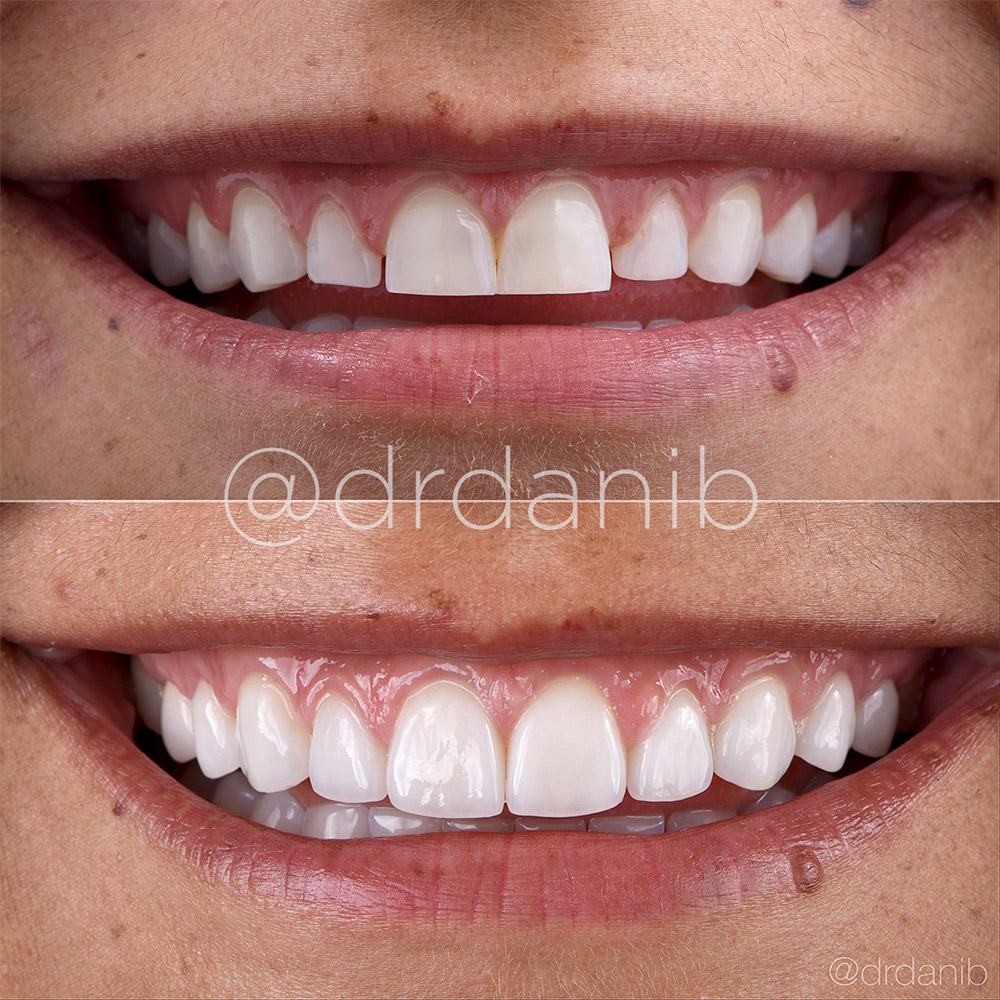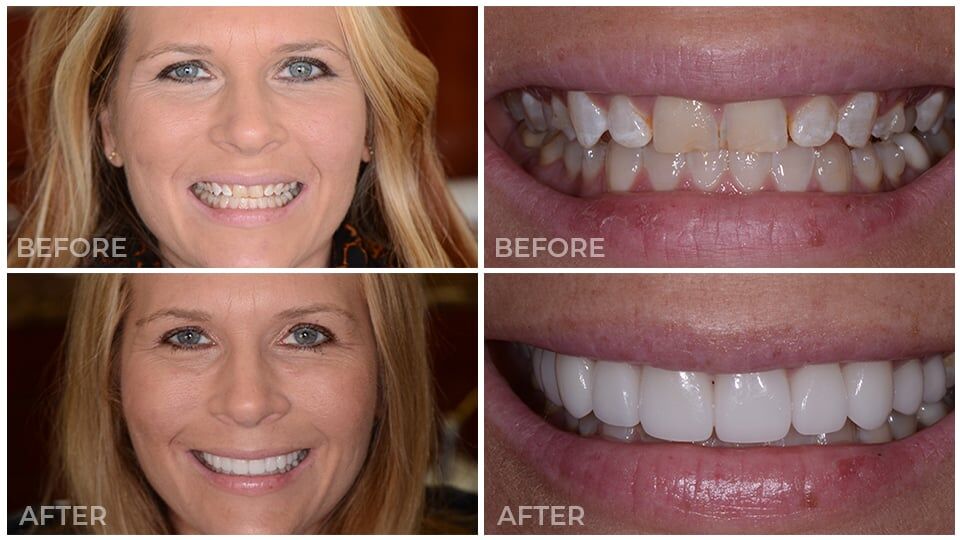Unlocking the Keys of Veneers: Facts, Kinds, and Benefits for a Lovely Smile
Veneers supply an engaging service for those looking for to enhance their smiles. These oral enhancements can attend to numerous blemishes, from staining to misalignment. With options like porcelain and composite, people can pick based upon their requirements and preferences. Nonetheless, understanding the nuances of veneers, consisting of application and care, is important. What aspects should one take into consideration before making a decision? The solutions might amaze those interested in this visual dental choice.

Understanding Veneers: What Are They?
Veneers are thin, customized coverings developed to cover the front surface area of teeth, enhancing their appearance. Typically crafted from sturdy products, these coverings are customized to fit each individual's teeth exactly. They serve numerous functions, including remedying visual flaws such as staining, chips, or voids. The application process includes a dentist preparing the teeth, frequently by getting rid of a tiny amount of enamel to guarantee a tight fit. When prepared, the veneers are adhered to the teeth making use of a solid adhesive.
Clients typically pick veneers for their capacity to create a natural-looking smile while giving a durable solution to dental flaws. Unlike various other aesthetic dental care options, veneers require marginal invasive treatments, making them a popular choice. The result is an enhanced smile that can considerably boost a person's self-confidence and self-worth. Generally, veneers provide an effective method to achieving a more attractive and unified oral look.
Kinds of Veneers: Porcelain vs. Compound
When considering aesthetic oral alternatives, two primary kinds of veneers stand apart: porcelain and composite. Porcelain veneers are crafted from a resilient ceramic material that mimics the all-natural appearance of teeth. They are understood for their tarnish resistance and ability to show light similarly to all-natural enamel, providing an aesthetic allure that numerous individuals desire. The application procedure typically involves more preparation of the tooth framework and may need numerous sees to the dental practitioner.
On the various other hand, composite veneers are made from a tooth-colored resin that is directly related to the teeth. This kind permits quicker application and can usually be completed in a solitary browse through. While they are less costly than porcelain veneers, they might not use the same durability or resistance to staining. Eventually, the option between porcelain and composite veneers depends upon private preferences, budget, and particular oral needs.
The Benefits of Choosing Veneers
Selecting veneers supplies various benefits that can significantly boost both the aesthetics and capability of a person's smile. One of the main benefits is their ability to remedy flaws such as discoloration, spaces, and misalignment, leading to a more consistent appearance. Veneers can additionally improve the resilience of teeth, giving a protective layer that shields them from damage.
They require minimal tooth preparation contrasted to various other oral treatments, preserving more of the all-natural tooth framework. This conservation adds to a healthier dental environment while still accomplishing a magnificent smile.
Veneers are extremely personalized, allowing people to select the form, size, and color that best matches their choices. Furthermore, they are stain-resistant, making it easier to keep a intense and eye-catching smile gradually. Overall, veneers provide an effective choice for those seeking both aesthetic enhancement and long-term oral health and wellness benefits.
The Veneer Application Process
The veneer application procedure involves a number of crucial steps to ensure suitable results. Initially, an appointment is performed to analyze the patient's needs, complied with by the preparation and shaping of the teeth. Ultimately, the veneers are adhered in position, with modifications created a best fit and appearance.
Initial Assessment Steps
A comprehensive preliminary examination is important for anyone considering veneers, as it sets the structure for a successful therapy. Throughout this conference, the oral specialist assesses the individual's oral health, talking about any existing issues that could affect the veneer application. This assessment may include X-rays and an aesthetic examination to determine the condition of the teeth and gum tissues.
The dental professional also engages the person in an in-depth conversation concerning their visual objectives, choices, and assumptions. They might offer different veneer choices customized to the individual's specific needs. Additionally, the expert clarifies the treatment, potential dangers, and aftercare needs, making sure that the patient is educated and comfortable before waging the treatment.
Preparation and Shaping Teeth
After the preliminary examination, the following phase entails the prep work and shaping of the teeth to accommodate the veneers. This important action is performed by the dental expert, that carefully assesses the tooth structure to determine the amount of enamel that requires to be gotten rid of. Commonly, a thin layer, usually around 0.5 millimeters, is cut off to assure an appropriate fit for the veneers. Precision is critical during this process, as it affects both the overall comfort and the aesthetic result. As soon as the teeth are appropriately shaped, impressions are required to develop customized veneers that line up completely with the person's dental account. This thorough prep work sets the stage for a successful veneer application, improving both look and feature.
Bonding and Last Adjustments
Following the shaping and prep work of the teeth, the bonding procedure starts, marking an important phase in the veneer application. Throughout this stage, a dental adhesive is applied to the prepared tooth surface area, ensuring a strong bond between the veneer and the tooth. The dentist thoroughly positions the veneer, making changes to achieve the wanted placement and aesthetic appeals. Once effectively positioned, a special light is used to treat the adhesive, strengthening the bond. After curing, the dentist performs last changes, cutting any kind of excess product and improving the veneer's shape to ensure an all-natural look. This mindful focus to information enhances both feature and aesthetic appeals, adding to an overall beautiful smile that is long lasting and lasting.
Taking care of Your Veneers: Upkeep Tips
Taking care of veneers is vital to maintain their look and longevity. A consistent daily cleaning routine, conscious evasion of discoloring foods, and regular oral examinations are essential elements of effective maintenance. These methods help assure that veneers remain in peak problem and remain to enhance one's smile.
Daily Cleansing Routine
Consistently maintaining veneers is necessary for their long life and look. A proper daily cleaning routine can help protect their shine and avoid damage. Dentists advise brushing twice a day with a soft-bristled toothbrush and fluoride tooth paste, making certain that all surfaces are cleansed gently to stay clear of scratching the veneer surface. Flossing daily is likewise vital to get rid of food fragments and plaque from in between teeth, where brushes may not get to. Additionally, utilizing an antimicrobial mouthwash can aid maintain oral health without damaging the veneers. It is a good idea to prevent abrasive cleansers and devices that can damage the veneer. By following these simple actions, people can keep their veneers looking lovely while advertising general dental health.
Avoiding Discoloration Foods
Veneers are developed to boost the look of teeth, their vulnerability to tarnishing demands cautious nutritional options. It is vital for people with veneers to be conscious of specific foods and drinks that can cause discoloration. Dark-colored products such as coffee, red a glass of wine, and berry juices must be consumed in moderation, as they are recognized to tarnish both all-natural teeth and veneers. Additionally, acidic foods like citrus fruits container damage the bonding agents utilized in veneers, making them more susceptible to staining. To keep a click here now brilliant smile, it is advisable to rinse the mouth with water after consuming staining foods and to practice routine dental hygiene. These thoughtful choices contribute considerably to the durability and appearances of veneers.

Routine Oral Examinations

Preserving the honesty of veneers requires a dedication to normal dental examinations, as these consultations play a crucial role in guaranteeing their long life and appearance. Throughout these brows through, oral experts can evaluate the condition of the veneers, inspecting for any kind of signs of wear, damage, or underlying dental problems. In addition, regular cleanings help get rid of plaque and tartar that can collect around the veneers, promoting overall oral health. Dental practitioners can additionally provide customized guidance on treatment strategies and products suited for veneer upkeep. By sticking to a schedule of check-ups, people can resolve possible problems early, guaranteeing their smile continues to be gorgeous and vibrant. Inevitably, regular oral visits are a crucial part of veneer care.
Is Veneers the Right Choice for You?
Determining whether veneers are the right choice typically rests on individual dental needs and visual goals. For those seeking to address problems such as staining, chips, or misalignment, veneers can offer a transformative remedy. Prospects generally include individuals blog with healthy and balanced teeth but want an improved smile.
Nevertheless, it is vital to think about elements such as tooth enamel problem, the extent of dental concerns, and the willingness to maintain veneers - Veneers Teeth. Consulting with an oral professional is vital, as they can review dental health and wellness and establish if veneers appropriate
Additionally, prospective candidates need to assess the long-lasting commitment, as veneers may require substitute every 10-15 years. Cost considerations likewise play a considerable function, as veneers can be a significant investment. Inevitably, the decision should be knowledgeable, stabilizing visual wishes with useful considerations for long-term outcomes.
Regularly Asked Questions
Exactly How Long Do Veneers Usually Last Before Needing Replacement?
Veneers usually last between 10 to 15 years before needing replacement. Aspects such as dental health, way of living options, and worldly high quality can affect their long life, making normal oral examinations vital for keeping their problem.
Are Veneers Safe for Individuals With Delicate Teeth?
Veneers can be safe for individuals with sensitive teeth, however it frequently relies on the seriousness of level of sensitivity and the dental professional's technique. Consulting a dental specialist prior to continuing is necessary to assure excellent end results.
Can Veneers Be Eliminated or Replaced Quickly?

Do Veneers Spot In Time, and How Can I Stop It?
Veneers can tarnish with time, specifically from foods and beverages like coffee or merlot. To avoid staining, keeping excellent oral health, using a straw for drinks, and regular dental cleansings are suggested methods.
What Is the Cost Variety for Obtaining Veneers?
The cost of veneers usually varies from $500 to $2,500 per tooth, depending upon aspects such as product kind, dental practitioner experience, and place. Individuals need to seek advice from dental specialists for personalized quotes and financing alternatives.
As soon as the teeth are sufficiently formed, impressions are taken to develop custom-made veneers that line up completely with the individual's dental profile. During this phase, an oral adhesive is used to the prepared tooth surface, guaranteeing a strong bond in between the veneer and the tooth. It is vital to take into account aspects such as tooth enamel problem, the extent of oral problems, and the determination to maintain veneers. Veneers can be risk-free for people with sensitive teeth, however it usually depends on the seriousness of level of sensitivity and the dental practitioner's strategy. The cost of veneers typically ranges from $500 to $2,500 per tooth, depending on variables such as product kind, dental professional experience, and area.